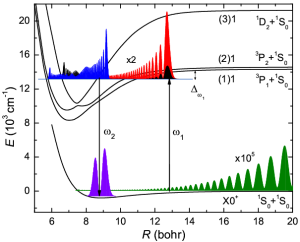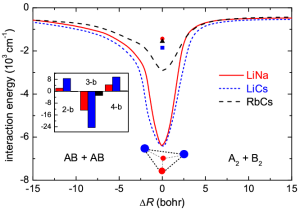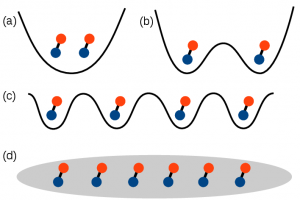We work on the intersection of theoretical atomic, molecular, and optical physics and quantum chemistry. We are primary interested in engineering controllable quantum molecular systems for both fundamental research and upcoming quantum technologies.
Formation, dynamics, and control of ultracold molecules
 Ultracold molecules have recently become a new powerful tool for investigating chemistry at its fundamental quantum limit. Heteronuclear molecules possessing a permanent electric dipole moment are promising candidates for numerous applications including quantum computing, quantum simulations, many-body physics, ultracold controlled chemistry, precision measurements, and tests of fundamental laws.
Ultracold molecules have recently become a new powerful tool for investigating chemistry at its fundamental quantum limit. Heteronuclear molecules possessing a permanent electric dipole moment are promising candidates for numerous applications including quantum computing, quantum simulations, many-body physics, ultracold controlled chemistry, precision measurements, and tests of fundamental laws.
We propose and investigate new methods of formation and control of ultracold molecules. We are interested in production of ultracold molecules via both photoassociation and magnetoassociation, and their control with external magnetic, electric, and laser fields. We also explore prospects for more complex systems such as highly magnetic and polar molecules as well as polyatomic molecules, and their possible applications.
Cold hybrid ion-atom systems
 Hybrid systems of laser-cooled trapped atomic or molecular ions and ultracold atoms combined in a single experimental setup are currently emerging as a new platform for fundamental research in quantum physics. Potential applications range from controlled ion-atom collisions and chemical reactions to quantum computations and simulations of solid-state physics. Another possible research direction is the formation of cold molecular ions for precision measurements, ultracold chemistry, or other novel applications.
Hybrid systems of laser-cooled trapped atomic or molecular ions and ultracold atoms combined in a single experimental setup are currently emerging as a new platform for fundamental research in quantum physics. Potential applications range from controlled ion-atom collisions and chemical reactions to quantum computations and simulations of solid-state physics. Another possible research direction is the formation of cold molecular ions for precision measurements, ultracold chemistry, or other novel applications.
We study properties and formation schemes of novel quantum ion-neutral systems including cold and ultracold mixtures of atomic and molecular ions with atoms, molecules, and Rydberg atoms. We also investigate their possible applications in quantum simulations, quantum computations, precision measurements, and ultracold chemistry.
Ultracold controlled chemical reactions
 The production of an ultracold high phase-space-density gas of polar molecules in their absolute rovibrational ground state allowed for groundbreaking experiments on controlled chemical reactions. An unprecedented control over quantum states of reactants both by selecting their internal states and by tuning dipolar collisions with an external electric field in a reduced dimensionality were achieved. The next expected milestone towards the state-to-state ultracold controlled chemistry will be the measurement and control of the product-state distributions.
The production of an ultracold high phase-space-density gas of polar molecules in their absolute rovibrational ground state allowed for groundbreaking experiments on controlled chemical reactions. An unprecedented control over quantum states of reactants both by selecting their internal states and by tuning dipolar collisions with an external electric field in a reduced dimensionality were achieved. The next expected milestone towards the state-to-state ultracold controlled chemistry will be the measurement and control of the product-state distributions.
We study the state-to-state dynamics of ultracold chemical reactions beyond the universal limit with a meaningful control over quantum states of both reactants and products. We are interested in proposing new simple collisional systems suitable for testing models of the chemical reactivity and product-state distributions, and its control with external fields. We also develop methods to describe such systems.
Quantum dynamics and simulations with quantum few-body systems
 Ultracold gases are ideal systems for engineering highly nontrivial states of matter. They allow one to prepare, manipulate, and measure with great accuracy strongly correlated quantum systems, and thus can serve as a perfect tool for quantum simulations. The problems of condensed-matter or other areas of physics can also be mapped on and solved by such quantum simulators.
Ultracold gases are ideal systems for engineering highly nontrivial states of matter. They allow one to prepare, manipulate, and measure with great accuracy strongly correlated quantum systems, and thus can serve as a perfect tool for quantum simulations. The problems of condensed-matter or other areas of physics can also be mapped on and solved by such quantum simulators.
We propose and investigate novel quantum few-body molecular systems for quantum simulations, quantum computations, and quantum sensing. We study interactions, quantum many-body phases, time-dependent dynamics, sources of decoherence, and possible control schemes with external laser, microwave, magnetic, and electric fields in these systems.